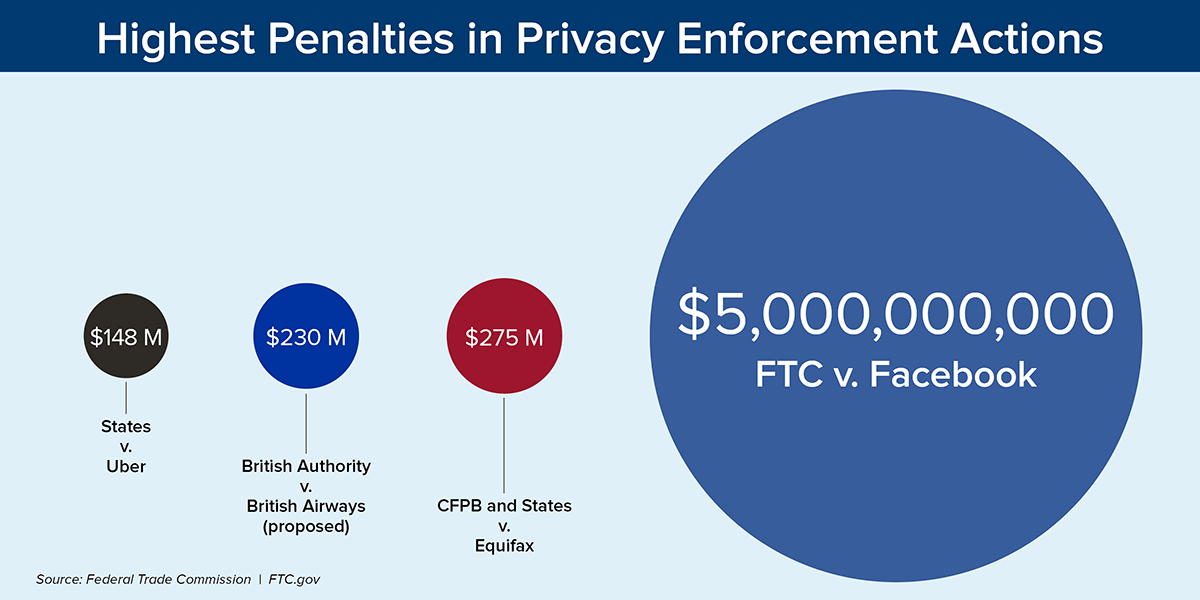What penalties can the FTC impose?
To trigger this provision, the FTC can send companies a Notice of Penalty Offenses – a document listing the conduct found to be deceptive or unfair. A company that receives a Notice and nonetheless engages in that unlawful practice can face civil penalties of $50,120 per violation.
What enforcement powers does the FTC have?
The FTC enforces federal consumer protection laws that prevent fraud, deception, and unfair business practices. The Commission also enforces federal antitrust laws that prohibit anticompetitive mergers and other business practices that could lead to higher prices, fewer choices, or less innovation.
Can the FTC levy fines?
§45(m)(1)(B). Under this authority, the Commission can seek civil penalties if it proves that (1) the company knew the conduct was unfair or deceptive in violation of the FTC Act and (2) the FTC had already issued a written decision (see below) that such conduct is unfair or deceptive.
Does the FTC have enforcement authority?
The Federal Trade Commission (FTC) functions primarily as a law enforcement agency. We undertake both court and administrative actions to enhance competition and protect consumers.
Can the FTC bring criminal charges?
While criminal charges can be served by the Department of Justice, the FTC is a civil law agency. This means that criminal charges will never be served by the FTC personally, although hefty and expensive civil charges can be.
Can FTC prosecute?
The prosecution of a matter is conducted by FTC “complaint counsel,” who are staff from the relevant bureau or a regional office.
What are FTC violations?
These cases can involve fraud, scams, identity theft, false advertising, privacy violations, anti-competitive behavior, and more.
What happens if you report to the FTC?
The FTC does not open a case for you. First, the FTC does not open cases for individual consumer complaints. A consumer will not have a case opened for them, or have the FTC negotiate on their behalf. There are far too many consumer complaints for the FTC to handle matters that way.
Are FTC cases civil or criminal?
The FTC is not a criminal agency, however. While criminal charges can be served by the Department of Justice, the FTC is a civil law agency.
What are the civil monetary penalties for FTC?
Our prediction came true, and we expect this to be a continued focus of enforcement activity in 2023. With the recent increase, the Commission can now seek up to $50,120 in civil penalties per violation of an FTC rule (or per day for ongoing violations).

What penalties can the FTC impose
To trigger this provision, the FTC can send companies a Notice of Penalty Offenses – a document listing the conduct found to be deceptive or unfair. A company that receives a Notice and nonetheless engages in that unlawful practice can face civil penalties of $50,120 per violation.
What enforcement powers does the FTC have
The FTC enforces federal consumer protection laws that prevent fraud, deception and unfair business practices. The Commission also enforces federal antitrust laws that prohibit anticompetitive mergers and other business practices that could lead to higher prices, fewer choices, or less innovation.
Can the FTC levy fines
§45(m)(1)(B). Under this authority, the Commission can seek civil penalties if it proves that (1) the company knew the conduct was unfair or deceptive in violation of the FTC Act and (2) the FTC had already issued a written decision (see below) that such conduct is unfair or deceptive.
Cached
Does the FTC have enforcement authority
The Federal Trade Commission (FTC) functions primarily as a law enforcement agency. We undertake both court and administrative actions to enhance competition and protect consumers.
Can the FTC bring criminal charges
While criminal charges can be served by the Department of Justice, the FTC is a civil law agency. This means that criminal charges will never be served by the FTC personally, although hefty and expensive civil charges can be.
Can FTC prosecute
The prosecution of a matter is conducted by FTC “complaint counsel,” who are staff from the relevant bureau or a regional office.
What are FTC violations
These cases can involve fraud, scams, identity theft, false advertising, privacy violations, anti-competitive behavior and more.
What happens if you report to the FTC
The FTC does not open a case for you
First, the FTC does not open cases for individual consumer complaints. A consumer will not have a case opened for them, or have the FTC negotiate on their behalf. There are far too many consumer complaints for the FTC to handle matters that way.
Are FTC cases civil or criminal
civil law
The FTC is not a criminal agency, however. While criminal charges can be served by the Department of Justice, the FTC is a civil law agency.
What are the civil monetary penalties for FTC
Our prediction came true, and we expect this to be a continued focus of enforcement activity in 2023. With the recent increase, the Commission can now seek up to $50,120 in civil penalties per violation of a FTC rule (or per day for ongoing violations).